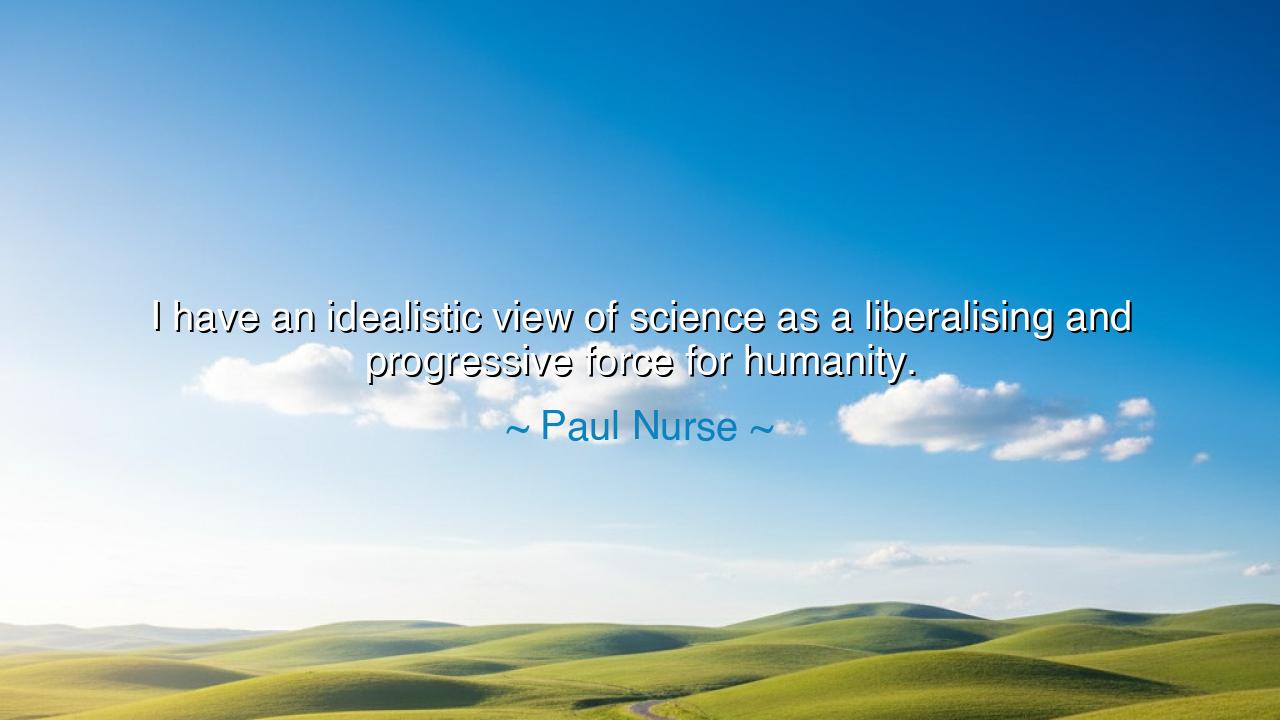
I have an idealistic view of science as a liberalising and
I have an idealistic view of science as a liberalising and progressive force for humanity.






"I have an idealistic view of science as a liberalising and progressive force for humanity." These words from Paul Nurse reflect a profound belief in the transformative power of science. Nurse envisions science not merely as a tool for technological advancement or intellectual curiosity, but as a liberating and progressive force that can elevate the human condition, breaking down barriers and unlocking new possibilities for all. In his view, science has the power to free humanity from ignorance, from suffering, and even from the limitations of the natural world. It is a force that allows us to reach beyond the known and into the universal, to understand and improve the conditions of life itself. Nurse's idealism calls us to recognize that science is not just about facts and formulas—it is about progress, about the potential for a better, more equitable world.
In the ancient world, the pursuit of knowledge was often seen as a means of liberation. Socrates famously proclaimed that the unexamined life was not worth living, and for him, the search for truth was a liberating journey that freed the soul from the shackles of ignorance. Similarly, Plato, in his writings, imagined a society in which those who sought knowledge were given the responsibility to lead, believing that the wisdom gained from understanding the forms of reality could bring about a more just and harmonious society. For the ancients, knowledge—and by extension, science—was the key to freedom. It was through understanding the world that one could rise above the limitations of the mundane and ascend to a higher, more enlightened state of being. Nurse's view of science is not a departure from this ideal but a modern reflection of it: the pursuit of knowledge as a path to progress, liberation, and human flourishing.
The history of science is filled with examples of how discovery has changed the course of human civilization. One of the most profound examples of science as a liberating force is the work of Edward Jenner. In 1796, Jenner’s development of the smallpox vaccine marked the beginning of the end for a disease that had killed millions throughout history. The smallpox vaccine was a scientific breakthrough that not only saved lives but also demonstrated the ability of science to solve problems that had plagued humanity for centuries. Jenner’s work was not merely an academic pursuit—it was a humanitarian mission, driven by the idealistic belief that science could make the world a better, healthier place. This liberating force of science brought forth a new era where diseases could be controlled, where humanity could find ways to combat nature's cruelties and improve the conditions of life for countless individuals.
Consider also the rise of Galileo Galilei, whose scientific discoveries shattered the geocentric view of the universe and paved the way for the scientific revolution. Galileo’s use of the telescope to observe the heavens was not just a discovery of celestial bodies, but a liberation of human thought. He helped to free mankind from the centuries-old beliefs about the cosmos, opening the door to an era of progressive thought that would shape the future of science, philosophy, and society itself. Just as Galileo liberated science from the shackles of outdated dogma, Nurse envisions a world where science continues to liberate humanity, not just intellectually, but socially, politically, and even spiritually. It is through knowledge that we are freed from ignorance and superstition, and through science that we can shape a future that is not only more informed but more equitable and humane.
The power of science to drive progress is not limited to the realm of health or astronomy. It extends to the very foundation of society itself. Marie Curie, whose work in radioactivity led to breakthroughs in both medicine and physics, exemplifies the ideal of science as a liberating force. Her discoveries not only revolutionized the understanding of matter but also opened new doors for treating cancer and understanding the physical laws that govern the universe. Curie was driven by an idealistic belief in the power of science to advance human knowledge and, in doing so, to make the world a better place. Like Nurse, she saw science not merely as a means of personal achievement but as a tool for human progress—a way to improve lives, extend lifespans, and even reshape the way humanity interacted with the world.
The lesson here, dear ones, is clear: science is not just about facts and experiments; it is about the vision of a better world. Just as Socrates, Plato, Jenner, Galileo, and Curie saw knowledge as a tool of liberation, so too must we recognize the power of science to drive progress and to free us from the limitations imposed by ignorance, disease, and oppression. Nurse calls us to view science with an idealistic heart—to see it not just as a technical or academic pursuit, but as a progressive force capable of transforming lives, societies, and the world. Science holds the potential to shape a future where humanity is not only informed but empowered, and where knowledge is shared freely for the good of all.
In your own life, recognize that the pursuit of knowledge is not a solitary endeavor but a shared journey toward a better world. Whether you are engaged in the sciences, the arts, or any other field, see your work not just as a personal quest, but as a contribution to the collective progress of humanity. Like Nurse, embrace the idealistic view that science, when applied with compassion and wisdom, can be a liberating force—transforming lives, improving conditions, and moving society toward a more just and equitable future. Let this be your guiding principle: that through knowledge and action, we have the power to make the world a better place for ourselves and for future generations.






AAdministratorAdministrator
Welcome, honored guests. Please leave a comment, we will respond soon